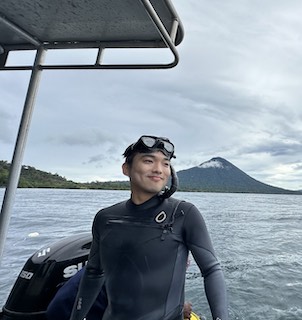At the first-ever Environmental Physiotherapy Festival 2023 I held a presentation beginning with a brief introduction on complex adaptive systems- a unifying area of study that encompasses information, evolution, neuroscience, and systems theories to shed light on an age-old question: what does it mean to be alive? Complex adaptive systems theory gives an integrative approach to understanding any self-organizing entity that adapts to changes in its environment- from weather patterns and stock market trends to the fluctuating feelings of a single person and even the movement of all life forms on Earth. Through the lens of complex adaptive systems, the one (e.g. organism) becomes the many (collective interrelation). And the many become One.
We move along to explore an updated look at cognition and the dynamic sense of self. Embodied cognition is a rising tide in the field of psychology in which thinking is no longer an exclusive operation being done within the dark confines of our skull, and thinking is dethroned from the privilege of master-controller.
We then continue to explore metaphors and their role in our meaning-making. Metaphors and analogization enable the abstract, nonmaterial concepts of human cerebral thoughts to reach both our feeling and understanding of the concept as an embodied experience as well as deliver these thoughts to another mind for their comprehension. With shared metaphors, two individuals can arrive at a common meaning of a concept and to an avenue of communication. Shared metaphors are foundational to embodied cognition, conceptual understanding, and interpersonal communication. Metaphors are a demonstration that our inner world is illuminated by our outer world, and our outer world reflects our inner world.
Metaphors (and thoughts) can go awry when they are incohesive with the concept they are trying to explain. The metaphors of today’s superorganism (society) give rise to narratives such as “the isolated individual in competition with their environment” or “nature is just a bunch of resources to be extracted and utilized for the progression of humans”. The metaphors and consequent understanding we have as a collective are not only incoherent with the actual knowledge that we have accumulated but are highly inflammatory for all inhabitants of this Earth.
With all these ideas in hand, we can update our sense of self. We can explore the metaphors we live by. We can apply a more cohesive, integrative model of one self, investigating our embodied self-experience. The one becomes the many, the many become one. And with a greater feeling of Oneness, perhaps we humankind can really become more kind.

Takuzo Kimura (DPT)
Physiotherapist, Tyack Health, Melbourne, Australia
References
Header image by Théo Roland on Unsplash
Barrett, L. F. (2017). How emotions are made: The secret life of the brain. Houghton Mifflin Harcourt.
Chapman, C. R., Tuckett, R. P., & Song, C. W. (2008). Pain and stress in a systems perspective: reciprocal neural, endocrine, and immune interactions. The journal of pain, 9(2), 122–145. https://doi.org/10.1016/j.jpain.2007.09.006
Cormack, B., Stilwell, P., Coninx, S., & Gibson, J. (2023). The biopsychosocial model is lost in translation: from misrepresentation to an enactive modernization. Physiotherapy theory and practice, 39(11), 2273–2288. https://doi.org/10.1080/09593985.2022.2080130
França, K., & Lotti, T. M. (2017). Psycho-Neuro-Endocrine-Immunology: A Psychobiological Concept. Advances in experimental medicine and biology, 996, 123–134. https://doi.org/10.1007/978-3-319-56017-5_11
Friston, K. The free-energy principle: a unified brain theory?. Nat Rev Neurosci 11, 127–138 (2010). https://doi.org/10.1038/nrn2787
Kirchhoff, M., Parr, T., Palacios, E., Friston, K., & Kiverstein, J. (2018). The Markov blankets of life: autonomy, active inference and the free energy principle. Journal of the Royal Society, Interface, 15(138), 20170792. https://doi.org/10.1098/rsif.2017.0792
Meissner K. (2011). The placebo effect and the autonomic nervous system: evidence for an intimate relationship. Philosophical transactions of the Royal Society of London. Series B, Biological sciences, 366(1572), 1808–1817. https://doi.org/10.1098/rstb.2010.0403
Ortega, M. A., Fraile-Martinez, O., García-Montero, C., Haro, S., Álvarez-Mon, M. Á., De Leon-Oliva, D., Gomez-Lahoz, A. M., Monserrat, J., Atienza-Pérez, M., Díaz, D., Lopez-Dolado, E., & Álvarez-Mon, M. (2023). A comprehensive look at the psychoneuroimmunoendocrinology of spinal cord injury and its progression: mechanisms and clinical opportunities. Military Medical Research, 10(1), 26. https://doi.org/10.1186/s40779-023-00461-z
Rucińska, Z., & Fondelli, T. (2022). Enacting Metaphors in Systemic Collaborative Therapy. Frontiers in psychology, 13, 867235. https://doi.org/10.3389/fpsyg.2022.867235
Solms, M. (2022) Hidden spring – A journey to the source of consciousness. Grantham Books Services.
Stilwell, P., Stilwell, C., Sabo, B., & Harman, K. (2020). Painful metaphors: enactivism and art in qualitative research. Medical humanities, medhum-2020-011874. Advance online publication. https://doi.org/10.1136/medhum-2020-011874
Varela, F. J., Thompson, E., & Rosch, E. (1991). The embodied mind: Cognitive science and human experience.

